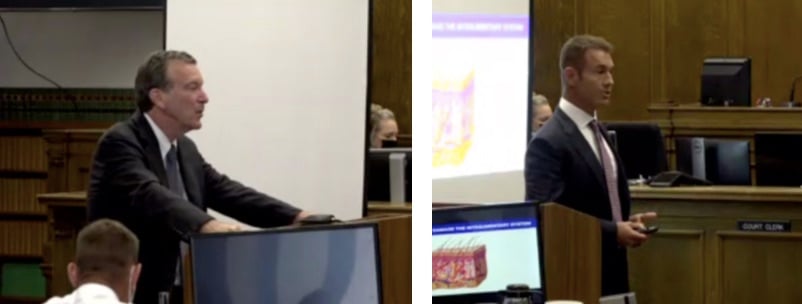
CVN screenshot of plaintiff attorneys Rick Friedman (left) and Nick Rowley (right) delivering their opening statements
Seattle, WA - Attorneys for three families claiming they suffered injuries from exposure to long-lasting chemicals manufactured by Bayer-owned Monsanto present in a local school told a Washington state court jury on Monday the company should pay $215 million in damages.
The trial getting underway in King County Superior Court is the fifth stemming from contamination at the Sky Valley Educational Center in the Monroe School District with polychlorinated biphenyls, or PCBs. PCBs, sometimes referred to as "forever chemicals" due to their durability, were used for a variety of industrial purposes before being banned in the 1970’s.
Three previous juries returned plaintiff verdicts at earlier Sky Valley PCB trials in the amounts of $62 million, $185 million, and $21 million, while the most recent trial ended in a mistrial with a hung jury unable to return a verdict.
During their opening statements on behalf of the plaintiffs, Rick Friedman of Friedman Rubin and Nick Rowley of Trial Lawyers for Justice told jurors that the students and parents they represent suffered a range of neurological injuries due to exposure to PCBs in the aging Sky Valley facility’s light fixtures and building caulk.
However Monsanto’s attorney, Kristen Rodriguez of Dentons, argued the plaintiffs' injuries are the result of mold and dust in a dilapidated building the local school district supposedly failed to properly maintain, and that the levels of PCBs present in the facility could not conclusively cause their illness.
The full trial is being webcast gavel-to-gavel by Courtroom View Network. CVN similarly recorded the four previous Sky Valley PCB trials to date in Seattle.
Friedman argued to jurors that Monsanto knew PCBs posed a health risk decades before being banned, and that internal documents would show the company knowingly withheld that information from the public while continuing to sell the chemicals.
“It had no proof that these PCBs were safe for human exposure, and in fact all of its knowledge was to the contrary,” Friedman said.
Friedman pushed back against the idea modern safety and regulatory standards shouldn't apply to how Monsanto operated nearly a century ago.
“There were standards and customs as far back as the 30’s and 40’s about how a responsible chemical company behaves.”
Friedman’s co-counsel Nick Rowley delivered the portion of plaintiff openings dealing with damages, and he argued to jurors $215 million was fair compensation for three families suffering with injuries that would impact them for the rest of their lives.
“A corporation can live forever,” Rowley said. “People can’t.”
Rowley explained the neurological damage associated with PCB exposure, telling jurors the chemicals are sometimes referred to as “brain thieves” due to the cognitive impairment they can cause.
“These are the human beings, the mothers, the students, that do have permanent damage to their brain function because of what the PCBs did, and it’s forever,” Rowley said.
During her opening on behalf of Monsanto, Rodriguez told jurors the plaintiffs’ case focuses on PCBs because their attorneys determined that would be the best way to win substantial damages.
"What you just heard from plaintiff counsel was all about fear, not facts, sensationalism not science, and it was all about demonizing Monsanto,” she said.

CVN screenshot of defense attorney Kristen Rodriguez delivering her opening statement
Rodriguez argued that the plaintiffs all began experiencing physical symptoms around the same time, and that it was natural for them to seek a common explanation, which meant consulting with both doctors and attorneys.
The aging Sky Valley facility’s poor ventilation conditions provided a likely explanation, but Rodriguez said that couldn’t serve as the basis for a $215 million damages request, so the plaintiff attorneys then focused their claims on PCBs.
The trial before Judge Douglas North is expected to take up to two months to complete. It will employ a hybrid format, with opening and closing arguments taking place in-person and all witness testimony taking place virtually over Zoom.
CVN’s gavel-to-gavel coverage will include live and on-demand video of both the in-person and virtual portions of the trial.
The case is captioned Allison, et al. v. Monsanto Company, case number 18-2-26074-4 in King County Superior Court, Washington.
E-mail David Siegel at dsiegel@cvn.com





